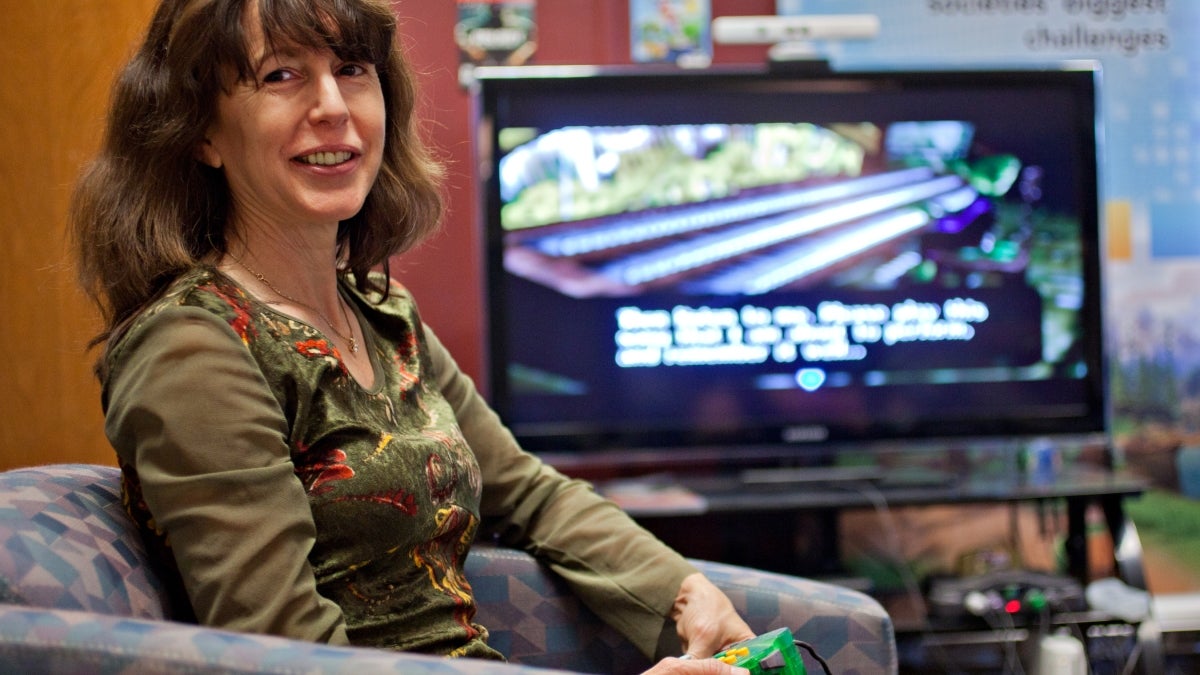Professor champions video gaming as valuable teaching tool for parents, teachers

The stereotype of young people isolating themselves by hunching in front of a video game screen is often far from the truth, says Elisabeth Hayes, recently appointed the Delbert & Jewell Lewis Chair in Reading & Literacy at ASU. Video gaming has become a social activity shared with other players that can lead to better communication skills and the development of sophisticated technical skills.
On the premise that parents can help their young gamers on the road to literacy, Hayes has begun doing research on the role of intergenerational video game play. She and Sinem Siyahhan, associate research professor in ASU's Sanford School of Social and Family Dynamics, are conducting focus groups at the ASU Preparatory campuses to learn how parents view video game play with their children.
“Parents often don’t know what their children are doing in terms of games, and they are puzzled by why gaming is so attractive," Hayes says. "They are missing an opportunity to leverage the power of video games by not engaging with them.
“Games are not played in isolation. They’re often a hub for social interactions, and young people go to fan sites and create artwork and tutorials for each other. They talk and write about the games, modify the games and learn to problem-solve.
“Game players often develop sophisticated technical and language skills that can lead to STEM (science, technology, engineering and math) careers. It’s a hidden opportunity for literacy that we could take advantage of as educators and parents.”
Parents who don’t feel comfortable playing video games can still ask their children questions about the games and promote their ability to think and talk about complex systems. She suggests they might help children identify appropriate fan communities, where gamers get together to discuss the games, create art, share fan fiction and play the games with each other.
“Parents are ambivalent about fan sites, especially with girls, fearing that they may be prey to predators," Hayes says. "We hope to make them more comfortable. Many fan sites around The Sims video games, for instance, won’t tolerate inappropriate behavior or language and are acceptable for children under 18.”
The Sims, one of the best selling computer games of all time, is an artificial life program in which gamers create their own households, building a home, choosing a career, keeping a budget, determining the family members’ aspirations and challenges, directing their moods and desires. Hayes wrote a book on the game, “Women and Gaming: The Sims and 21st Century Learning,” in 2010 with professor James Gee.
She is particularly interested in gender issues in gaming, since games designed for girls typically are less rich, without the ability to modify the codes. They generally lack active fan communities. Her 2000 book, “Women as Learners,” won the international Houle Award for Outstanding Literature in Adult Education.
Hayes says that she also is interested in whether joint game play can promote positive relations between preteens and parents. Because children often are more adept at video games, the interaction between parents and children may be one of equals.
She hopes to organize some structured gaming nights for parents and children at the ASU Preparatory Academies next semester, to observe and to develop resources for helping parents facilitate their children’s learning.
“Video gaming can actually lead to rich, valuable communication between parents and children, and between peers," she says. "It can have an effect on a child’s choices of classes, the interests they pursue and their choice of careers.”
Hayes’ recent research also includes an investigation of the digital literacy practices of freshman education majors at ASU, to be published in the Journal of Technology and Teacher Education. She found that most respondents, the majority of whom were female, were not particularly interested in video gaming and may not understand its potential value as a teaching tool.
Female teachers in particular may not be able to connect with or respond to boys’ interest in gaming, she said. Many boys are passionate about gaming and this interest might be something that teachers can use as writing and research topics.
Before coming to ASU in 2007, Hayes was a founding member of the Games, Learning and Society research group at the University of Wisconsin-Madison, where she also chaired the English education program. She was named a 2011 White House Champion of Change for her work on using games and digital media to engage girls in computing.
Her work has been supported by the National Science Foundation, the MacArthur Foundation, the National Institutes of Health and the Annie E. Casey Foundation.
For more information and resources on using digital games in learning, go to http://gamesandimpact.org/